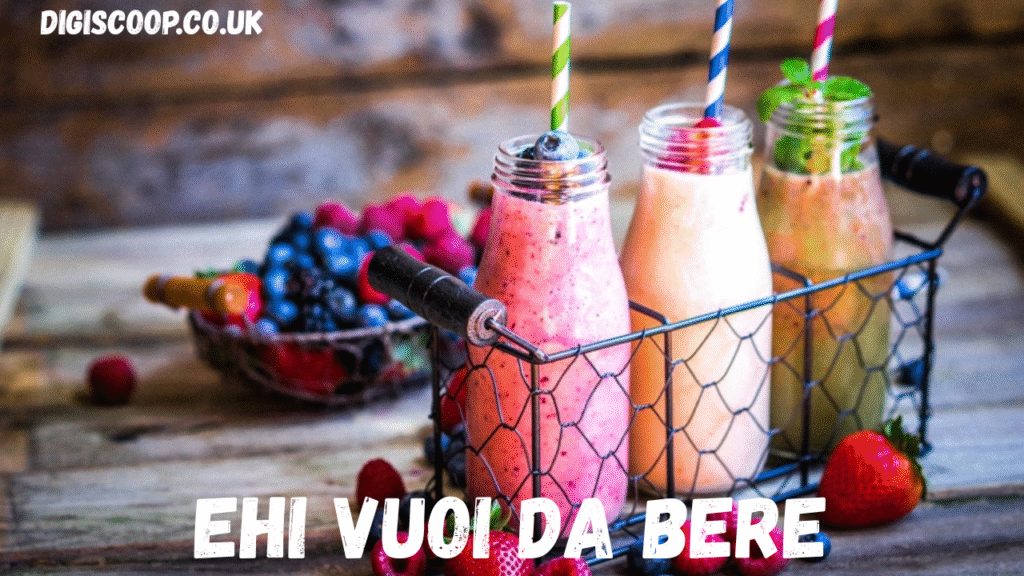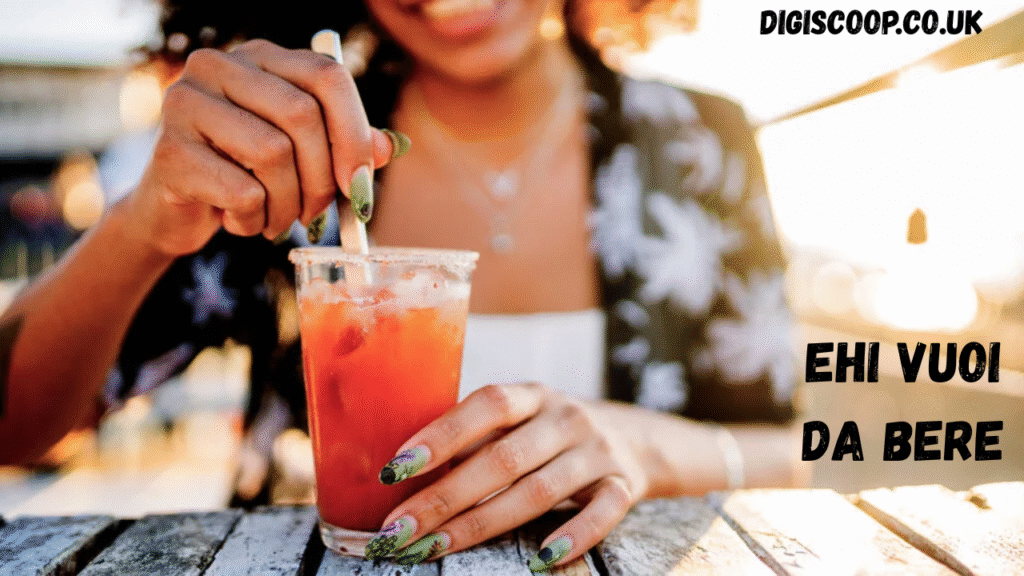The True Meaning and Cultural Charm of Ehi Vuoi da Bere Exploring the Italian Phrase Its Emotion and Social Connection

“Ehi vuoi da bere” is an Italian phrase that, when translated, simply means “Hey, do you want something to drink?” Yet this short, melodic expression carries more emotion, meaning, and connection than its words might suggest. It is one of those phrases that defines how Italians live, love, and communicate with warmth, sincerity, and an open heart. When someone says “ehi vuoi da bere,” it is not only an offer of a drink but also an invitation into their world. It is a gentle bridge from one person to another, a symbol of shared moments and mutual respect. In Italy, words are never just words they are melodies of emotion, gestures of empathy, and reflections of culture. The tone, the smile, and the timing of “ehi vuoi da bere” turn it into more than a sentence; it becomes a shared experience, a moment of genuine human connection that lingers beyond the drink itself.
Cultural Importance and Everyday Use of Ehi Vuoi da Bere

In Italian culture, the phrase “ehi vuoi da bere” is heard everywhere from bustling cafés and lively family dinners to romantic terraces overlooking the Mediterranean. It captures the spirit of hospitality that lies at the core of Italian society. When an Italian offers you a drink, it’s never just about quenching thirst; it’s about warmth, respect, and togetherness. “Ehi vuoi da bere” is a symbol of generosity and inclusion, expressing the deep cultural belief that sharing food and drink builds friendship and trust. Italians use it naturally in everyday life, between colleagues during a break, between friends catching up, or between strangers who might soon become companions. The simple question turns into a meaningful gesture that says, “You are welcome here, and your presence matters.” In a country where conversation and community are cherished, “ehi vuoi da bere” stands as one of the purest reflections of that social beauty.
Romantic and Emotional Shades of Ehi Vuoi da Bere
Beyond its everyday use, “ehi vuoi da bere” often carries romantic undertones, becoming a tender way to express interest or affection. A quiet “ehi vuoi da bere” shared across a table can mark the beginning of love, curiosity, or connection. Italians, known for their expressive emotions and natural charm, often use this phrase as a first step toward intimacy. The act of offering someone a drink transforms into a symbolic offering of time, attention, and care. In romantic moments, it’s less about the beverage and more about the feeling it’s a subtle invitation to share one’s company, to begin a story. In films, songs, and poems, “ehi vuoi da bere” often appears as the spark that ignites emotion, an echo of the Italian belief that love begins not with grand declarations but with small, heartfelt gestures that reveal sincerity and warmth.
The Linguistic Simplicity and Beauty of Ehi Vuoi da Bere

Linguistically, “ehi vuoi da bere” showcases the effortless beauty of the Italian language. “Ehi” is the friendly attention-grabber, similar to “hey” in English; “vuoi” comes from “volere,” meaning “to want”; and “da bere” literally means “to drink.” Together, they form a phrase that feels both casual and kind, making it adaptable to countless situations. The flow of the words, soft yet rhythmic, mirrors the musical quality of spoken Italian. Every syllable invites warmth, every pause feels natural, and every repetition feels like a song of sincerity. The Italian language, rich with emotion, often turns ordinary expressions into poetic gestures and “ehi vuoi da bere” is one of the finest examples of this. Its simplicity is its strength; it proves that human connection doesn’t require complexity just genuine intent and heartfelt tone.
Ehi Vuoi da Bere and Italian Hospitality
Hospitality is the soul of Italian culture, and “ehi vuoi da bere” is the perfect symbol of it. From northern vineyards to southern coastal towns, Italians are known for their warmth and generosity toward guests. Offering a drink is often the first act of welcome when someone enters a home or a café. It’s not about formality it’s about making the other person feel at ease, valued, and comfortable. When an Italian host asks, “ehi vuoi da bere,” they are expressing the heart of their tradition: kindness through sharing. It’s an action rooted in centuries of cultural pride, where food and drink are not just sustenance but a language of love and unity. Every glass of wine, every cup of espresso, every sip shared under the Italian sun carries the same unspoken message “You are part of this moment with me.”
The Modern Use and Influence of Ehi Vuoi da Bere

In today’s modern world, “ehi vuoi da bere” has moved beyond traditional contexts and found its place in pop culture, music, and social media. It has become a playful, universal expression that conveys friendliness, curiosity, and charm. People use it as a casual icebreaker, a flirtatious text, or even a humorous caption. In songs, the phrase is often used to represent connection and the beginning of something beautiful a conversation, a friendship, or love. Even beyond Italy, “ehi vuoi da bere” resonates with people because it captures something timeless and human: the desire to connect. In a world where digital communication often feels cold, this simple Italian phrase reminds us that warmth and emotion can still flow through words, that one friendly offer can bridge any distance.
The Psychological Power of Offering a Drink
Psychologically, offering someone a drink expressed through “ehi vuoi da bere” has profound effects on human relationships. It serves as a small but powerful gesture that triggers feelings of inclusion, safety, and connection. Sharing a drink breaks social barriers, encourages trust, and fosters openness. It is an ancient human ritual, found in every culture, that signifies peace, friendship, and acceptance. The Italian version, however, adds a special emotional depth because it’s intertwined with warmth and sincerity. Saying “ehi vuoi da bere” creates a space where people feel seen and valued. It softens conversations, builds bonds, and transforms strangers into friends. It shows how even in modern times, a simple question can hold the power to make people feel connected in a world often filled with distance.
Ehi Vuoi da Bere and the Italian Way of Life
The phrase “ehi vuoi da bere” is more than just language it is a reflection of the Italian philosophy of life. Italians live by the belief that happiness is found in simplicity, in shared laughter, in food and drink enjoyed together, and in moments filled with genuine emotion. The phrase represents this philosophy perfectly: it is short, kind, and full of meaning. It reminds people to slow down, to savor the present, to appreciate others’ company. Whether said over morning coffee, during sunset aperitifs, or at midnight gatherings, “ehi vuoi da bere” carries the same message life is better when shared. In this simple act lies the entire Italian spirit: passion without pretense, generosity without expectation, and joy without limit.
Global Understanding of Ehi Vuoi da Bere
As Italian culture continues to inspire the world, “ehi vuoi da bere” has become a recognizable phrase across languages and borders. It appears in travel blogs, romantic movies, and global cafés as a symbol of charm and hospitality. Even non-Italians who use it feel the warmth it carries. The phrase has transcended language barriers, becoming a universal expression of friendliness and emotional openness. It teaches the world that true connection doesn’t always need grand gestures; sometimes, it begins with something as simple and sincere as offering a drink. “Ehi vuoi da bere” has, in a way, become an ambassador of Italian humanity inviting everyone, everywhere, to slow down, smile, and share a moment of kindness.
Conclusion
In conclusion, “ehi vuoi da bere” is not just a phrase; it is a philosophy, a feeling, and a reflection of a culture that values connection over isolation. It is a small gesture that speaks volumes, a reminder that human warmth still begins with kindness. From friendships to love stories, from family dinners to everyday greetings, it lives in the heart of Italian life. “Ehi vuoi da bere” teaches that happiness is not found in things but in shared experiences, in the beautiful simplicity of saying, “Let’s enjoy this moment together.”
FAQs
Q1: What does “ehi vuoi da bere” mean?
It means “Hey, do you want something to drink?” in English, but it carries warmth, friendliness, and care.
Q2: Is “ehi vuoi da bere” used formally or casually?
It is an informal phrase used in friendly, social, or romantic situations.
Q3: Why is it culturally significant in Italy?
Because it represents Italian hospitality, generosity, and the importance of shared experiences.
Q4: Can “ehi vuoi da bere” be romantic?
Yes, in romantic settings it can express affection or an interest in someone special.
Q5: What makes “ehi vuoi da bere” universal?
Its emotional simplicity—it represents kindness, connection, and the human desire to share moments together.
Read More: June Baranco The Graceful Journey of Bryant Gumbel First Wife




